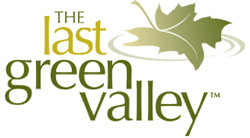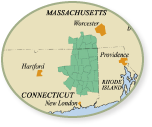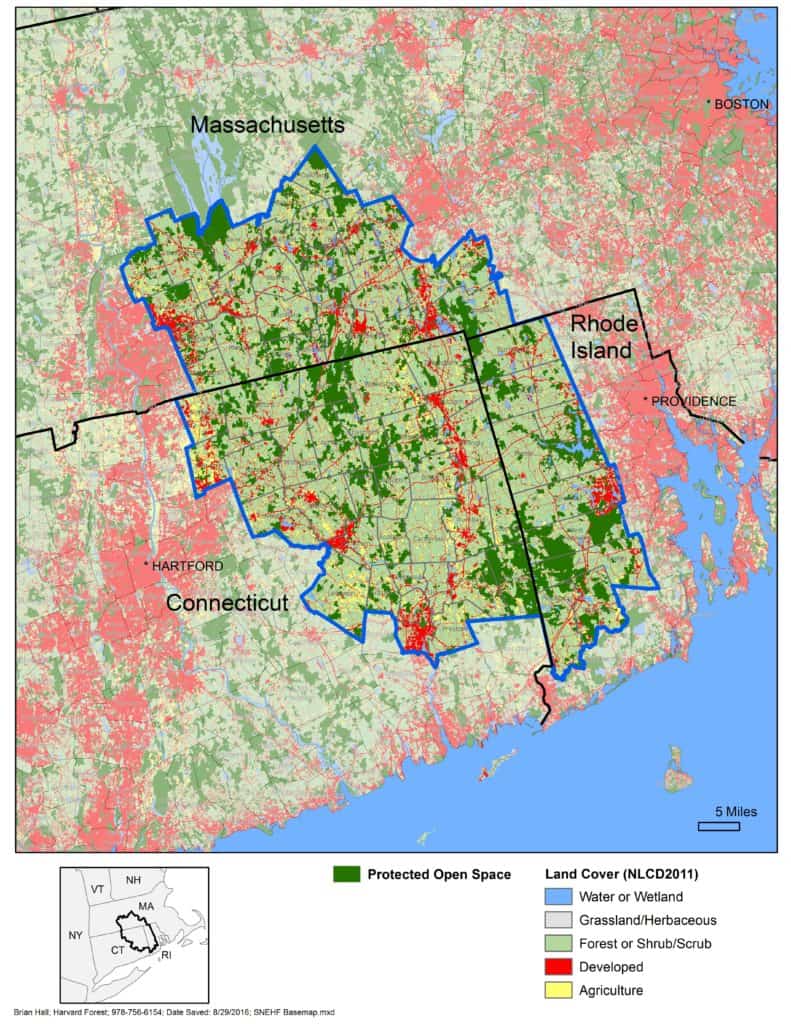The Southern New England Heritage Forest (SNEHF)
The Southern New England Heritage Forest (SNEHF) is a unique 1.49 million-acre unfragmented forest corridor stretching along the CT & RI border to the Quabbin Reservoir in MA. Bounded on the east and west by more heavily urbanized areas with more than one million nearby residents, SNEHF has an astonishing 76% forest cover and offers one of the last viable wildlife corridors from southern to northern New England. SNEHF’s woodlands are threatened by development; ownership lies overwhelmingly in the hands of private family forest owners and only 26% is permanently protected.
Because the SNEHF is so significant, a conservation partnership was formed to bring additional funding to the region through the Regional Conservation Partnership Program (RCPP) of the USDA Natural Resources Conservation Service (NRCS).
The over-arching goal of this RCPP was to keep forests as forests, maintaining as much unfragmented forest as possible. By keeping forest as forest, and by managing for specific conservation objectives on individual parcels, this project's goals were to improve habitat for fish, wildlife & invertebrate species of concern, support the recovery of endangered or threatened species and improve biodiversity; protect recharge areas for surface and groundwater supplies, preventing water quality degradation; foster resiliency and stand diversity for adaptation to climate change; and minimize air quality impacts and enhance carbon sequestration.
Partners created an outreach and education campaign that reached approximately 2,037 people and another 10,000 people were reached through direct mail, e-newsletters, press releases, flyers, web pages, newsletter and magazine articles and social media posts.
Partners provided technical assistance to landowners to develop 142 forest management plans with bird habitat assessments on 8,905 acres, which exceeded the original goal of 6,000 acres. The partners developed a new and flexible 3-state process to implement this component.
Partners assisted landowners with EQIP applications, practice planning, contract management and practice implementation. All funds for this component were obligated prior in 24 contracts covering forest management practices on 953 acres.
Partners assisted landowners with HFRP applications, program management, and easement development. The partners created a new ranking and scoring system that was supported by innovative GIS mapping, with different scoring criteria for each of the 3 states. Today, funding has been obligated for 8 projects totaling 901 acres in 3 states.
Partners contributions included the creation of additional forest management plans and practices covering approximately 2,000 acres, restoration plan development, GIS mapping, resource monitoring including water quality monitoring and compatible easement acquisitions on approximately 2,079 acres.
Lasting impacts include: strong partner collaboration with a breadth of partners that will lead to future woodland conservation projects; an infusion of federal dollars into a forested region that is often left out; the introduction of many new landowners into the conservation pipeline, leading to future conservation activity; a demonstrated demand for forest easement programs; a spin-off, successful 821-acre forest legacy project in CT; a successful spin-off northeast CT land trust advancement initiative to accelerate conservation in the region; a GIS conservation “Mega-Mapper” with comprehensive protected open space data layer; and the RI Forest Health Works RCPP.
Partners: NRCS, The Last Green Valley, Inc., MassConn Sustainable Forest Partnership/Opacum Land Trust, Northern RI Conservation District, MA Executive Office of Energy & Environmental Affairs, Providence Water, Yale School of Forestry & Environmental Studies, CT Department of Energy & Environmental Protection, Hull Forest Products, Thames River Basin Partnership, New England Forestry Foundation, Eastern CT Conservation District, Norcross Wildlife Foundation, RI Division of Forest Management, RI Woodland Partnership, Harvard Forest, Yale Sustaining Family Forests Institute, Audubon Connecticut, Audubon RI, and Mass Audubon.
Please Support Us!
The Last Green Valley, Inc. (TLGV) is a 501(c)(3) non-profit.
We rely on your membership contributions and donations to carry out our work. Together, we can care for it, enjoy it, and pass it on.


